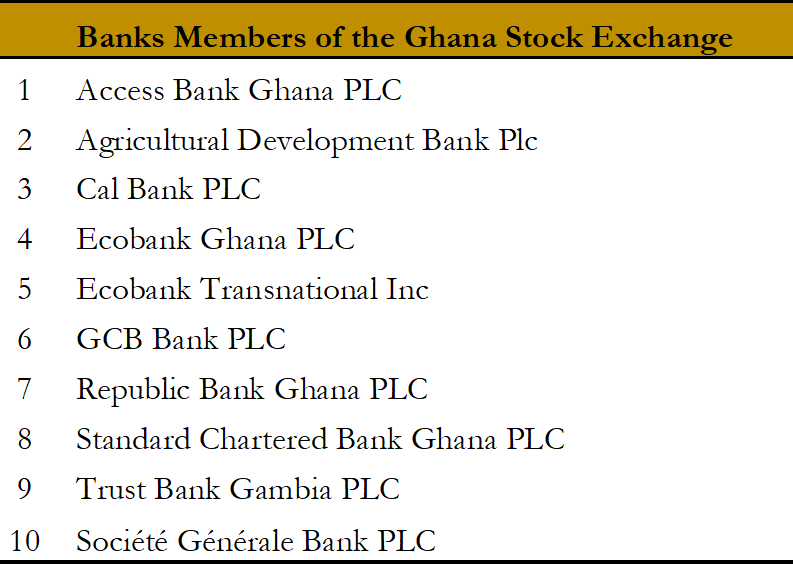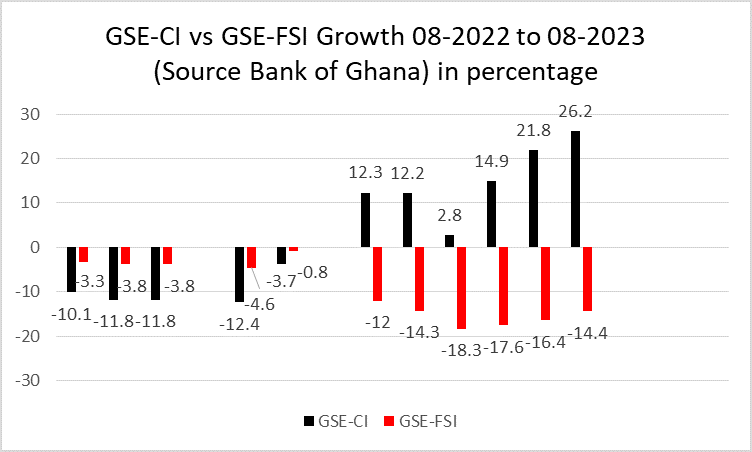The weight of financial stocks in Ghana’s financial market
Jackson Okine Annan, Atlanta - Gerorgia, USA
April 09, 2024
T he Ghana Stock Exchange (GSE) has 10 banks on its main listing board. They make up one third of the number of companies listed on the GSE. Together, these banks had combined market capitalization of US$1 billion (GHC 12.7 billion) at the end of 20231. Société Générale Bank Plc (France), Standard Chartered Bank (UK) and Ecobank (Togo) and Trust Bank Gambia are subsidiaries of foreign or pan-African banks. Ecobank Transnational Incorporation (ETI) is the largest listed bank by market capitalization with US$258.4 million (GH₵3.97 billion).
GSE Financial Stocks Index (GSE-FSI)
After the establishment of the GSE in July 1989, the exchange launched two indices: the GSE Composite Index (GSE-CI) and the GSE Financial Stocks Index (GSE-FSI) in January 2011. Ordinary shares of financial firms on the GSE are constituents of the GSE-FSI.

Source: Ghana Stock Exchange
The base date of GSE-FSI was December 31st, 2010, and the base index value, 1,000. An index measures the performance of a representative sample of companies or a subset of the market based on their capitalization, company size, or industry. The base year provides a starting point for the index. Changes in the index value over time are relative to that base year. The calculation of the GSE Composite Index (GSE-CI) is based on the ‟weighted average closing price‟ of listed stocks, which includes the stocks of banks, insurance, and mutual funds2.
The GSE-CI adds the market prices of each stock in the index and divides this total by the number of stocks. It must adjust for stock splits and other changes in the index portfolio to maintain the integrity, timeliness and continuity of the series over time. This is different from an equal-weighted index, which allocates the same weight to each of its constituent stocks. Also, in a price weighted index, a percentage change in a high-priced stock will cause a substantial swing, compared to the same percentage for a low-priced stock.
Performance
In 2022-2023, the GSE-FSI recorded average negative growth. The GSE-CI also underperformed over the last three quarters of 2023.

Data visualization www.neweconomyghana.com, April, 2023
However, according to the International Monetary Fund (IMF), the banking sector remains resilient, thanks to financial sector cleanup conducted between 2017 and 2019. In 2023, the financial sector went through a domestic debt restructuring program, which affected their profitability because of their sizeable exposure to the public sector.
In January 2024, the Bank of Ghana (BoG) announced that the banking sector’s performance has improved. It said that the adverse spillovers from the domestic debt restructuring and macroeconomic challenges had receded. BoG data shows that the banking sector remains stable, liquid, and profitable. The Bank of Ghana expects early recapitalization and effective risk management by banks at the end of the IMF-government reform program. The goal is to maintain the sector’s stability and resilience and ensure effective financial intermediation to strengthen the economic recovery efforts.
Banks remain active securities issuers, market participants and custodians. The financial and insurance activities contributed to 3.7 percent of the GDP in 20213. But, the sector has untapped economic and market opportunities. A portion of the population remains unbanked. In 2021, according to the World Bank, 32 percent of the population did not have an account at a regulated institution4.
The industry faces other systemic challenges. Exposure to external risks continues to loom over the banks. According to the association of Ghana Association of Banks (GAB), banks are susceptible to macroeconomic factors and external shocks beyond their control. Specifically, changes in interest rates, foreign exchange rates, or global economic conditions affect profitability, asset quality, lending activities, and eventually the performance of the GSE-FSI.
Related Articles
BIBLIOGRAPHY
1❩ Bank of Ghana (2023): Summary of Economic Financial Data (September-2023), - https://www.bog.gov.gh/wp-content/uploads/2023/09/Summary-of-Economic-Financial-Data-September-2023.pdf
2❩ The GSE-CI is a market capitalization weighted index, i.e. each constituent is given weight according to its market capitalization. The base date for the GSE-CI is December 31, 2010 and the base index value is 1000.
3❩ https://www.gipc.gov.gh/wp-content/uploads/2022/12/Ghanas-Financial-Sector-Report.pdf
4❩ Global Findex Database Ghana 2021
